OPERA
STAGE AND SCREEN
nonizetti at Covent Garden
Parsifal and Don Pasquale cheek by jowl ! The most frivolous product of the operatic stage beside Wagner's Sacred Festival Drama ! Such oddity could only have been surpassed by the substitution of Lucrezia Borgia or Lucia di Lammermoor for the farcical Don. But Donizetti's tragic heroines are for English
audiences dead as mutton, killed, be it remarked, not by Wagner's Isolde or Kundry, but by Verdi's Leonoras and Puccini's ladies of high sentiments and doubtful morality.
For all his pamphleteering, Wagner no more supplanted the old Italian opera than Richard's Salome supplanted Joharm's "Blue Danube." They inhabit different worlds. But when Verdi wrote Otello, he made it so impossible to revive Rossini's opera of that name, that I doubt if one in twenty of my readers even knows of its existence.
There was no parallel development of opera buffa during the nineteenth century, and the solitary contributions to the form
by Verdi and Puccini are not sufficient to supply relief from
battle, murder and sudden death. &sides it is much easier for modern audiences to accept the conventions of opera buffa than
those of the tragic variety with its mad heroines carolling
roulades to an obliging flautist who takes his time from the prbna donna's fan, just as we accept the conventions of Restora-
tion Comedy more readily than those of even Dryden's tragedies.
And, whatever may be said about the lack of reality in the characters, who behave like so many puppets, and the plots
with their mechanical intrigues, the opere buffe remain amusing and tuneful entertainments. Don Pasquale may not be a great masterpiece, but, sung and acted with style, it passes an evening more agreeably than many a more pretentious piece.
Since, however, the mind is never exercised, the style of the performance is all important. One can enjoy a fairly good
performance of Otello or of Tristan for the sake of their music.
The music in Don Pasquale is all concentrated in the voice, and without fine singing the whole opera falls flat. In the
performance that I saw at Covent Garden, the singing was mostly mediocre and the acting unimaginatively conventional. Every now and them Mme. Favero, and still more often Signor Biasini, gave us a few bars of the real thing. Mme. Favero
can sing a soft legato phrase with clearness, accuracy and charm ; but, when she turns on the full pressure, her voice
becomes less pleasing. Nor has her deportment that aristo- cratic air which is essential if we are not to apply the adjective " common " to that baggage, Norina. Signor Umberto di
Lelio proved an ordinary routinier basso buffo with all the old
tricks and grimaces at hand, but without the spark of individual- ity to lift Don Pasquale out of the conventional rut. As to
the tenor, upon whom so much depends—well, as no excuse was made for Signor Borgioli on the grounds that he was suffering from the English complaint called by the Frenchman sangfroid habitue!, I can only suppose that his husky lack of resonance was not due to any affection of the throat.
Then there was the scenery. One does not expect, under the conditions at Covent Garden, an expensive setting for an opera given three performances and, perhaps, unlikely to be revived for many years. Indeed expense is not called for by this opera. But a greater effort might have been made not only to produce a coherent style of scenery and costume, but also a pleasing effect to the eye. Strict attention to period is, perhaps, not requisite in a farce of this nature. But in
place of what should have been a delightful fantastication such as Mr. Rex Whistler might have imagined, we were given a humdrum setting that was mostly disagreeable in colour and design and that included some wigs and costumes not later than George II, rococo candelabra, circa rno, on
the walls and a pot-stand that shouted "French Empire" at you across the footlights. Finally the orchestra under Signor Salfi, of whom I hoped for better things on the basis of his performances early in the year, blared away coarsely and unfeelingly, as if they were trying to pretend that the "big guitar was a Wagnerian orchestra. No, I fear this is not the way in which to bring Donizetti's facile and delightful muse back into pullic favour.
DYNELEY Hinny.














































 Previous page
Previous page